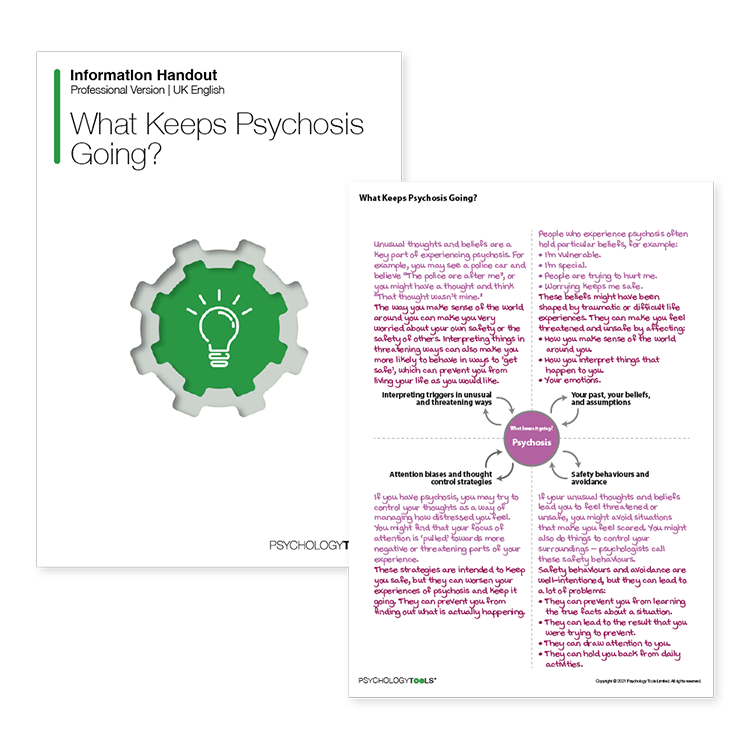What Keeps Psychosis Going?
The "What Keeps It Going?" series is a set of one-page diagrams explaining how common mental health conditions are maintained. Friendly and concise, they provide an easy way for clients to understand at a glance why their disorders persist, and how they might be interrupted. What Keeps Psychosis Going? is designed to help clients with psychosis understand more about their condition.
Download or send
Tags
Languages this resource is available in
Problems this resource might be used to address
Techniques associated with this resource
Mechanisms associated with this resource
Introduction & Theoretical Background
It is surprisingly common to see or hear things that other people don’t, or to hold beliefs that other people might find unusual. If you keep hearing voices or seeing things that aren’t there (in a way which causes you distress, and prevents you from living your life as you want), you may be experiencing psychosis. Psychosis can cause a wide spectrum of experiences which include:
- Hearing voices or sounds that no-one else can hear.
- Seeing, feeling, smelling or tasting things that others can’t.
- Holding unusual beliefs that others around you do not share.
- Struggling to think or concentrate. (You may come across as muddled to others.)
- Acting strangely or unpredictably. (Your behavior may seem unusual to others.)
- Struggling to do daily activities such as working, studying, or caring for yourself.
- Feeling disconnected. (You may not feel emotions as strongly as you used to.)
Research studies have shown
Therapist Guidance
“One interesting way of thinking about psychosis is to look at why, for some people, it does not get better by itself. This handout shows some of the most common reasons why some people keep experiencing symptoms of psychosis. I wonder if we could look at it together and think about whether it describes some of what is happening for you?”
References And Further Reading
- Beavan, V., Read, J., & Cartwright, C. (2011). The prevalence of voice-hearers in the general population: a literature review. Journal of Mental Health, 20(3), 281-292.
- McGrath, J. J., Saha, S., Al-Hamzawi, A., Alonso, J., Bromet, E. J., Bruffaerts, R., ... & Kessler, R. C. (2015). Psychotic experiences in the general population: a cross-national analysis based on 31 261 respondents from 18 countries. JAMA psychiatry, 72(7), 697-705.
- Morrison, A. P. (2001). The interpretation of intrusions in psychosis: an integrative cognitive approach to hallucinations and delusions. Behavioural and Cognitive Psychotherapy, 29(3), 257-276.
- Morrison, A. P. (2017). A manualised treatment protocol to guide delivery of evidence-based cognitive therapy for people with distressing psychosis: learning from clinical trials. Psychosis, 9(3), 271-281.
- National Collaborating Centre for Mental Health (2014). Psychosis and schizophrenia in adults: treatment and management.




